|
|
|
Sort Order |
|
|
|
Items / Page
|
|
|
|
|
|
|
| Srl | Item |
| 1 |
ID:
187261
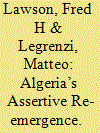

|
|
|
|
|
| Summary/Abstract |
Algeria is re-emerging as an active player in international politics following the Arab Spring uprisings that swept across the Middle East and North Africa beginning in 2010–11. But it has adopted a much different posture from the one it maintained during the 1960s and 1970s. The broadly accommodative attitude that Algiers previously exhibited towards the outside world has been replaced by a more combative stance. Military power has become its primary tool for managing inter-state disputes, and Algeria has stepped up its involvement in the domestic affairs of nearby states. These changes have contributed to the resurgence of conflict in North Africa at a moment when the regional order might well have moved in a more peaceful direction.
|
|
|
|
|
|
|
|
|
|
|
|
|
|
|
|
| 2 |
ID:
154342
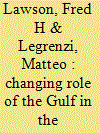

|
|
|
|
|
| Summary/Abstract |
In the past half-decade, the role of the Gulf in the international political economy has changed dramatically. The region’s position as a supplier of world hydrocarbons has slipped, even as local consumption of oil and gas continues to expand. Gulf investments have shifted from the industrialized countries to the Middle East and North Africa. Saudi Arabia no longer exercises disproportionate influence in the Group of 20. Finally, relations with the People’s Republic of China and India have become truly interdependent, which gives the Gulf the capacity to exercise leverage over these two rising powers, despite its diminished position in global affairs.
|
|
|
|
|
|
|
|
|
|
|
|
|
|
|
|
| 3 |
ID:
142163


|
|
|
|
|
| Summary/Abstract |
Relations between the People's Republic of China (PRC) and the countries of the Gulf have been subjected to an escalating barrage of scholarly scrutiny. At first, academic writing subsumed Beijing's dealings with the Arab Gulf states and Iran into comprehensive surveys of Chinese policy toward the Middle East as a whole. Three landmark monographs fixed the bar for these initial accounts: Yitzhak Shichor's The Middle East in China's Foreign Policy, Hashim Behbehani's China's Foreign Policy in the Arab World and John Calabrese's China's Changing Relations with the Middle East.1 Efforts to situate the PRC's policies toward the Gulf in the context of broader regional developments continue up to the present, as exemplified by Geoffrey Kemp's The East Moves West.2 Such first-generation studies set out to be comprehensive not only geographically, but thematically as well. Attention is usually paid to a wide range of diplomatic, military, economic and cultural trends, albeit with an emphasis on interstate diplomacy.
|
|
|
|
|
|
|
|
|
|
|
|
|
|
|
|
| 4 |
ID:
048708
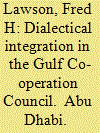

|
|
|
|
|
| Publication |
Abu Dhabi, Emirates Cemter for Stategic Studies and Research, 1997.
|
| Description |
52p.
|
| Series |
Emirates Occasional Papers; no. 10
|
|
|
|
|
|
|
|
|
|
|
|
Copies: C:2/I:0,R:0,Q:0
Circulation
| Accession# | Call# | Current Location | Status | Policy | Location |
| 039332 | 341.2477/LAW 039332 | Main | On Shelf | General | |
| 040499 | 341.2477/LAW 040499 | Main | On Shelf | General | |
|
|
|
|
| 5 |
ID:
157505


|
|
|
|
|
| Summary/Abstract |
Egypt and Ethiopia continue to oppose one another over the allocation of the waters of the Nile River basin, despite a succession of provisional multilateral agreements. Officials in Cairo insist that Egypt be guaranteed its “historic rights” to two-thirds of the river’s flow, while their counterparts in Addis Ababa demand an “equitable” distribution of water among all of the riparian countries. More important, Sudan’s shift in alignment from Egypt to Ethiopia has injected new tension into the dispute, and the sustained involvement of South Sudan, Kenya, Uganda and Eritrea heightens the likelihood that periodic crises will escalate into armed confrontations. Consequently, existing studies that offer sanguine assessments of the potential for a compromise settlement fail to address the key dynamics that drive the conflict.
|
|
|
|
|
|
|
|
|
|
|
|
|
|
|
|
| 6 |
ID:
145255


|
|
|
|
|
| Summary/Abstract |
Recent studies of Egypt's long-standing dispute with Ethiopia over the distribution of the waters of the Nile River assume that the adoption of the Nile Basin Initiative in 1999 heralded a sharp turn toward regional conciliation and harmony. This assumption is unwarranted, given Cairo's insistence that its “historic rights” to the Nile be preserved and the belligerent response by Egyptian politicians to Ethiopia's inauguration of the Millennium Project in the spring of 2013. A careful survey of recent relations between the two states demonstrates that the dispute retains a high potential for severe conflict.
|
|
|
|
|
|
|
|
|
|
|
|
|
|
|
|
| 7 |
ID:
148784
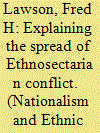

|
|
|
|
|
| Summary/Abstract |
Ethnic civil wars tend to spread to adjacent countries, yet the processes whereby diffusion takes place remain obscure. Quantitative studies point to a wide range of factors and dynamics that drive ethnosectarian conflicts across international borders with no consensus regarding the causal potency of these variables or the ways in which they interact with one another. Surveying the most influential theories that have been advanced so far clarifies the logic of disparate arguments and offers hypotheses that can be tested against particular cases. The civil war in Syria represents one notable instance in which fighting along ethnosectarian lines provoked a revival of political violence in a neighboring state, the Turkish Republic. Applying existing theories to this empirical case clarifies promising directions for future research.
|
|
|
|
|
|
|
|
|
|
|
|
|
|
|
|
| 8 |
ID:
136205
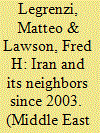

|
|
|
|
|
| Summary/Abstract |
Iranian foreign policy in the 25 years after the 1978-79 revolution centered on the cultivation of strategic alignments with a wide range of radical states and revolutionary movements throughout the Middle East. Relations with this heterogeneous collection of regional partners, particularly those with Syria and the Lebanese Shii organization Party of God (iezbollah), left the Islamic Republic vulnerable to periodic threats of entrap¬ment and abandonment by its allies. This in turn had a direct impact on Iran's relations with regional adversaries
|
|
|
|
|
|
|
|
|
|
|
|
|
|
|
|
| 9 |
ID:
070461


|
|
|
| 10 |
ID:
152544


|
|
|
|
|
| Summary/Abstract |
Why the uprisings that broke out across the Middle East and North Africa in 2010-11 ousted the leaders of republics but left monarchies largely intact remains puzzling. One promising explanation for the resilience of monarchical regimes argues that monarchs exercise repression in a comparatively restrained and largely effective fashion. Proponents of this theory tend to conflate two crucial causal factors: the level of state coercion exercised against opposition activists and the degree of indiscriminateness with which coercion is deployed. By treating these variables as analytically distinct, a more compelling explanation for monarchical resilience can be advanced. The advantages of the revised argument are illustrated by revisiting the divergent trajectories of the uprisings in Bahrain, Oman, Saudi Arabia and Kuwait.
|
|
|
|
|
|
|
|
|
|
|
|
|
|
|
|
| 11 |
ID:
135870
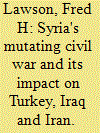

|
|
|
|
|
| Summary/Abstract |
Recent trends in the Syrian civil war have caused important shifts in alignment among neighbouring states. The conflict has exhibited a sharp turn towards ethno-sectarian violence, fighting among rival factions of the opposition and loss of central command over peripheral districts. In conjunction with the rise of the radical Islamist movement called the Islamic State in Iraq and the Levant (ISIL) and the Kurdish Democratic Union Party, these developments precipitated a raging, multisided battle that spread across Syria's northeastern provinces, and sparked renewed sectarian conflict inside Turkey and Iraq. Turkey and Iran responded to the growing ethno-sectarianization of the civil war by taking steps to conciliate the largely autonomous Kurdistan Regional Government (KRG), as well as one another. Rapprochement with the KRG alienated Turkey and Iran from Iraq, prompting Iraqi officials to step up military operations along the Syrian frontier. These moves set the stage for large-scale intervention in Iraq by ISIL, which further weakened Iraq's positon in regional affairs. The resulting reconfiguration of relations accompanied a marked increase in belligerence by non-state actors, most notably the Kurdistan Workers' Party (PKK), which buttressed Turkey's newfound ties to the Kurdistan Regional Government and Iran.
|
|
|
|
|
|
|
|
|
|
|
|
|
|
|
|
|
|
|
|
|